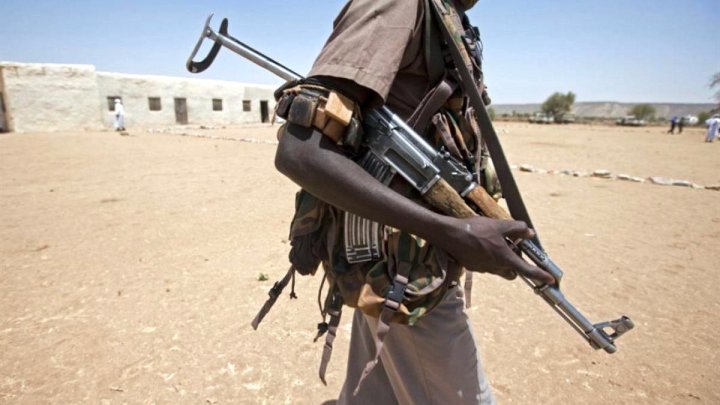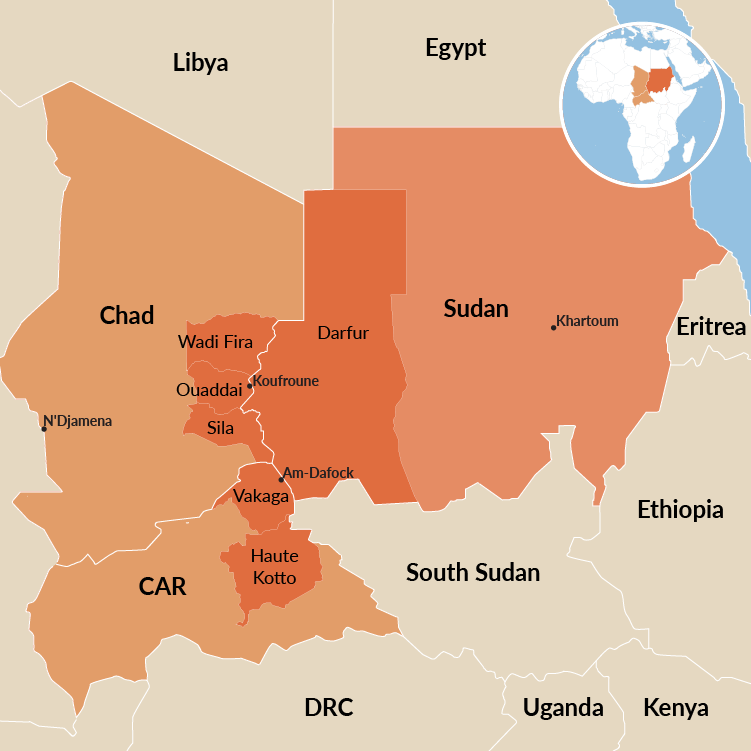ISS TODAY OP-ED
Sudan’s potentially expansive war poses severe risks for Chad and CAR

With their shared border communities and militia activities, the two countries have previously suffered from Sudan’s deadly conflicts.
Opponents in Sudan’s deadly clashes seem determined to continue fighting despite repeated calls from neighbouring countries, the African Union and United Nations for a ceasefire. The stalemate is worrying for Sudan’s neighbours, particularly Chad and the Central African Republic (CAR), which have previously felt the devastating impact of deadly conflicts in the country.
More than 500 people have been killed and over 4,000 injured in the bloodshed that broke out on 15 April between the Sudanese Armed Forces (SAF) under General Abdel Fattah al-Burhan and the Rapid Support Forces (RSF) led by General Mohamed Hamdan Dagalo (Hemedti).
Read more in Daily Maverick: Time running critically short to stop spread of Sudan bloodshed
Chad shares a long 1,300 km boundary with Sudan. Bordering Darfur in western Sudan, the eastern regions of Chad and CAR’s northeast have suffered from the fighting that started in that region in around 2003. In Chad, Janjaweed militias have caused several hundred deaths in the Wadi Fira, Ouaddai and Sila provinces. In CAR, the prefectures of Vakaga and Haute-Kotto have felt the atrocities of these militias. Both countries have hosted Sudanese refugees.

Sudan, Chad and CAR. (Graphic: Supplied by ISS)
Chad, CAR and Sudan have in common a group of communities whose movement has never been stopped by administrative boundaries. These include the Rounga, various Arab tribes, Zaghawa, Tama and Massalit. In past clashes, they were mobilised by multiple rebellions and other militias, regardless of nationality.
The Janjaweed in all three countries has mainly mobilised Arab communities. Rebel groups in Darfur, such as Khalil Ibrahim’s Justice and Equality Movement, were predominantly Zaghawa. CAR’s Seleka rebellion also mobilised groups such as the Rounga, the Arab community and others.
Some states have used militias, warriors and weapons in these border areas to fuel insecurity. Under Idriss Déby Itno and Omar al-Bashir, Chad and Sudan supported destabilisation efforts in both countries. When the Seleka started gaining ground in CAR’s northeast, fingers were pointed at Khartoum and N’Djamena.
Darfur’s major conflicts over the past two decades have turned regional. That makes Sudan’s current impasse worrying for Chad and CAR, which are in fragile political and security situations. Chad is undergoing a contested transition, with security risks still acute in parts of the country, including the east.
CAR is still trying to gain control of its entire territory despite military support from Rwanda and the private Russian company Wagner. The Vakaga prefecture, for example, is a regular theatre for attacks by rebel groups run by Noureddine Adam and Ali Darassa. Due to these rebellions, Sudan closed its border with CAR earlier this year.
Read more in Daily Maverick: As Russia’s Wagner mercenaries expand over Africa, the continental air smells of Cold War again
In Sudan’s current conflict, community members belonging to certain tribes and ethnic groups could aggravate the fragility of countries to the west. Indeed, Hemedti’s RSF is a fundamentally Arab entity. And while they were still the Janjaweed operating in Darfur, these paramilitaries alienated communities like the Zaghawa.
While the SAF seems representative of Sudan’s populations, al-Burhan had earlier allied with former leaders of the Zaghawa militias in Darfur, notably Suliman Arcua Minnawi, the current Darfur governor. So al-Burhan counts among his allies the Zaghawa, who are at loggerheads with Hemedti. The principle is well known: the friend of your enemy may easily become your enemy. How these cross-border communities position themselves in the war will be important.
In Chad, for example, power has been held by Déby’s son for the past two years, following his father’s three decades as president. The ruling family belongs to the Zaghawa ethnic group, while several senior members of the Chadian transition belong to the Arab community. In CAR, some rebels now stationed in the country’s north also belong to the Arab community.
Despite their posture of neutrality, both countries could become embroiled in the Sudan conflict because of these cross-border community dynamics. Chad sent additional troops to its border with Sudan and closed it at the start of the clashes. The border with CAR remains open.
Both countries have also already started experiencing an influx of refugees and returnees. Chad has recorded between 10,000 and 20,000 refugees in Koufroune, 320 Sudanese soldiers fleeing hostilities and more than 300 Chadian returnees.
In mid-April, the United Nations warned it wouldn’t be able to feed the 600,000 refugees in Chad from May onwards if it didn’t receive emergency international funding. In CAR, the border city of Am Dafok in the north has already taken in more than 6,240 Sudanese refugees and over 3,460 CAR returnees since the conflict began.
The economic impact of Sudan’s war will also be felt by its western neighbours. Although Chad and CAR depend mainly on Cameroon for their exports and imports, eastern Chadian provinces and north-eastern CAR prefectures trade with Sudan and so could be affected. In the Vakaga localities, the price of basic foodstuffs has risen since the fighting began.
CAR and Chad should urgently step-up measures to contain possible spillovers. Engaging with leaders of transborder communities could help prevent community members from joining the fighting.
For those working on regional political and diplomatic solutions to Sudan’s conflict, the security concerns of CAR and Chad in relation to this crisis must also be considered.
Humanitarian agencies in all three countries need financial support to deal with new refugees, internally displaced persons and returnees. It is vital that the international community and the African Union’s African Humanitarian Agency are mobilised in all affected countries. DM
Remadji Hoinathy, Senior Researcher, Central Africa and Great Lakes, Institute for Security Studies (ISS) and Dr Yamingué Bétinbaye, Director of Research, Centre de recherches en anthropologie et sciences humaines, N’Djaména, Chad.
First published by ISS Today.
















 Become an Insider
Become an Insider
Comments - Please login in order to comment.